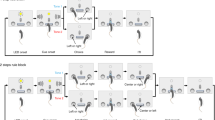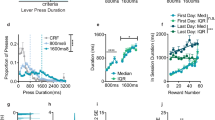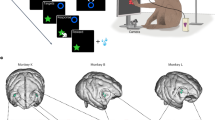Abstract
The ability to optimize behavioural performance when confronted with continuously evolving environmental demands is a key element of human cognition. The dorsal anterior cingulate cortex (dACC), which lies on the medial surface of the frontal lobes, is important in regulating cognitive control. Hypotheses about its function include guiding reward-based decision making1, monitoring for conflict between competing responses2 and predicting task difficulty3. Precise mechanisms of dACC function remain unknown, however, because of the limited number of human neurophysiological studies. Here we use functional imaging and human single-neuron recordings to show that the firing of individual dACC neurons encodes current and recent cognitive load. We demonstrate that the modulation of current dACC activity by previous activity produces a behavioural adaptation that accelerates reactions to cues of similar difficulty to previous ones, and retards reactions to cues of different difficulty. Furthermore, this conflict adaptation, or Gratton effect2,4, is abolished after surgically targeted ablation of the dACC. Our results demonstrate that the dACC provides a continuously updated prediction of expected cognitive demand to optimize future behavioural responses. In situations with stable cognitive demands, this signal promotes efficiency by hastening responses, but in situations with changing demands it engenders accuracy by delaying responses.
This is a preview of subscription content, access via your institution
Access options
Subscribe to this journal
Receive 51 print issues and online access
$199.00 per year
only $3.90 per issue
Buy this article
- Purchase on Springer Link
- Instant access to full article PDF
Prices may be subject to local taxes which are calculated during checkout




Similar content being viewed by others
References
Williams, Z. M., Bush, G., Rauch, S. L., Cosgrove, G. R. & Eskandar, E. N. Human anterior cingulate neurons and the integration of monetary reward with motor responses. Nature Neurosci. 7, 1370–1375 (2004)
Botvinick, M., Nystrom, L. E., Fissell, K., Carter, C. S. & Cohen, J. D. Conflict monitoring versus selection-for-action in anterior cingulate cortex. Nature 402, 179–181 (1999)
Brown, J. W. & Braver, T. S. Learned predictions of error likelihood in the anterior cingulate cortex. Science 307, 1118–1121 (2005)
Gratton, G., Coles, M. G. & Donchin, E. Optimizing the use of information: strategic control of activation of responses. J. Exp. Psychol. Gen. 121, 480–506 (1992)
Hayden, B. Y. & Platt, M. L. Neurons in anterior cingulate cortex multiplex information about reward and action. J. Neurosci. 30, 3339–3346 (2010)
Narayanan, N. S. & Laubach, M. Neuronal correlates of post-error slowing in the rat dorsomedial prefrontal cortex. J. Neurophysiol. 100, 520–525 (2008)
Botvinick, M. M., Cohen, J. D. & Carter, C. S. Conflict monitoring and anterior cingulate cortex: an update. Trends Cogn. Sci. 8, 539–546 (2004)
Carter, C. S. & van Veen, V. Anterior cingulate cortex and conflict detection: an update of theory and data. Cogn. Affect. Behav. Neurosci. 7, 367–379 (2007)
Carter, C. S. et al. Anterior cingulate cortex, error detection, and the online monitoring of performance. Science 280, 747–749 (1998)
Nieuwenhuis, S., Schweizer, T. S., Mars, R. B., Botvinick, M. M. & Hajcak, G. Error-likelihood prediction in the medial frontal cortex: a critical evaluation. Cereb. Cortex 17, 1570–1581 (2007)
Davis, K. D., Hutchison, W. D., Lozano, A. M., Tasker, R. R. & Dostrovsky, J. O. Human anterior cingulate cortex neurons modulated by attention-demanding tasks. J. Neurophysiol. 83, 3575–3577 (2000)
Davis, K. D. et al. Human anterior cingulate cortex neurons encode cognitive and emotional demands. J. Neurosci. 25, 8402–8406 (2005)
Bush, G. & Shin, L. M. The Multi-Source Interference Task: an fMRI task that reliably activates the cingulo-frontal-parietal cognitive/attention network. Nature Protocols 1, 308–313 (2006)
Bush, G., Shin, L. M., Holmes, J., Rosen, B. R. & Vogt, B. A. The Multi-Source Interference Task: validation study with fMRI in individual subjects. Mol. Psychiatry 8, 60–70 (2003)
Bush, G. et al. Functional magnetic resonance imaging of methylphenidate and placebo in attention-deficit/hyperactivity disorder during the multi-source interference task. Arch. Gen. Psychiatry 65, 102–114 (2008)
Fellows, L. K. & Farah, M. J. Is anterior cingulate cortex necessary for cognitive control? Brain 128, 788–796 (2005)
Kerns, J. G. et al. Anterior cingulate conflict monitoring and adjustments in control. Science 303, 1023–1026 (2004)
Nakamura, K., Roesch, M. R. & Olson, C. R. Neuronal activity in macaque SEF and ACC during performance of tasks involving conflict. J. Neurophysiol. 93, 884–908 (2005)
Holroyd, C. B. & Coles, M. G. The neural basis of human error processing: reinforcement learning, dopamine, and the error-related negativity. Psychol. Rev. 109, 679–709 (2002)
Botvinick, M. M. Conflict monitoring and decision making: reconciling two perspectives on anterior cingulate function. Cogn. Affect. Behav. Neurosci. 7, 356–366 (2007)
Ito, S., Stuphorn, V., Brown, J. W. & Schall, J. D. Performance monitoring by the anterior cingulate cortex during saccade countermanding. Science 302, 120–122 (2003)
Mayr, U., Awh, E. & Laurey, P. Conflict adaptation effects in the absence of executive control. Nature Neurosci. 6, 450–452 (2003)
Ridderinkhof, K. R. Micro- and macro-adjustments of task set: activation and suppression in conflict tasks. Psychol. Res. 66, 312–323 (2002)
Mansouri, F. A., Buckley, M. J. & Tanaka, K. Mnemonic function of the dorsolateral prefrontal cortex in conflict-induced behavioral adjustment. Science 318, 987–990 (2007)
Gehring, W. J. & Fencsik, D. E. Functions of the medial frontal cortex in the processing of conflict and errors. J. Neurosci. 21, 9430–9437 (2001)
di Pellegrino, G., Ciaramelli, E. & Ladavas, E. The regulation of cognitive control following rostral anterior cingulate cortex lesion in humans. J. Cogn. Neurosci. 19, 275–286 (2007)
Cole, M. W., Yeung, N., Freiwald, W. A. & Botvinick, M. Cingulate cortex: diverging data from humans and monkeys. Trends Neurosci. 32, 566–574 (2009)
Rauch, S. L. et al. Volume reduction in the caudate nucleus following stereotactic placement of lesions in the anterior cingulate cortex in humans: a morphometric magnetic resonance imaging study. J. Neurosurg. 93, 1019–1025 (2000)
Asaad, W. F. & Eskandar, E. N. A flexible software tool for temporally-precise behavioral control in Matlab. J. Neurosci. Methods 174, 245–258 (2008)
Acknowledgements
This work was supported by grants from the National Science Foundation (IOB 0645886), the National Institutes of Health (NEI 1R01EY017658-01A1, NIDA 1R01NS063249, NIMH Conte Award MH086400 and R25 NS065743), the Klingenstein Foundation, the Howard Hughes Medical Institute, the Sackler Scholar Programme in Psychobiology, the Centers for Disease Control (5 R01 DP000339), the Benson-Henry Institute at Massachusetts General Hospital for Mind–Body Medicine, the David Judah Fund, the McIngvale Fund, and the Center for Functional Neuroimaging Technologies (P41RR14075).
Author information
Authors and Affiliations
Contributions
E.N.E., W.F.A., Z.M.W. and D.D.D. designed the study. G.B. administered and interpreted the fMRI scans. E.N.E. performed the surgical procedures, and S.A.S., M.K.M., S.R.P. and W.F.A. obtained the neuronal recordings. S.A.S. and M.K.M. analysed the data and wrote the manuscript. All authors edited the manuscript.
Corresponding author
Ethics declarations
Competing interests
The authors declare no competing financial interests.
Supplementary information
Supplementary Information
This file contains Supplementary Figures 1-9, Supplementary Methods, Supplementary Table 1, a Supplementary Discussion and Supplementary Notes 1-4. (PDF 1942 kb)
Rights and permissions
About this article
Cite this article
Sheth, S., Mian, M., Patel, S. et al. Human dorsal anterior cingulate cortex neurons mediate ongoing behavioural adaptation. Nature 488, 218–221 (2012). https://doi.org/10.1038/nature11239
Received:
Accepted:
Published:
Issue Date:
DOI: https://doi.org/10.1038/nature11239
This article is cited by
-
Conflict detection and resolution in macaque frontal eye fields
Communications Biology (2024)
-
Single-neuronal elements of speech production in humans
Nature (2024)
-
Neurophysiological mechanisms of error monitoring in human and non-human primates
Nature Reviews Neuroscience (2023)
-
Targeted visual cortex stimulation (TVCS): a novel neuro-navigated repetitive transcranial magnetic stimulation mode for improving cognitive function in bipolar disorder
Translational Psychiatry (2023)
-
Neurocomputational mechanism of real-time distributed learning on social networks
Nature Neuroscience (2023)
Comments
By submitting a comment you agree to abide by our Terms and Community Guidelines. If you find something abusive or that does not comply with our terms or guidelines please flag it as inappropriate.



